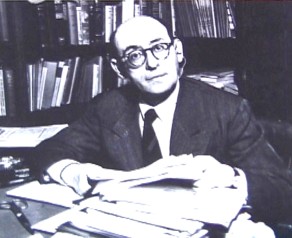| Franz Neumann, a political scientist, was a member
of the Frankfurt School emigre community in the United States. After a
month of imprisonment by the Nazis in April 1933, Neumann escaped to England.
He joined the Frankfurt Institute of Social Research in 1936. He is best
known for his analysis of fascism, Behemoth: The Structure and Practice
of National Socialism 1933-1944 (Oxford, 1942, 1944). In 1941 Neumann
was recruited to the U.S. Board of Economic Warfare, and in July 1942 he
became the chief economist in the Intelligence Division at the Office of
the U.S. Chief of Staff. In 1943 Neumann was transferred to the Office
of Strategic Services (OSS), where he became deputy chief of the Central
European Section. In 1954 he died unexpectedly in a car accident.
- For more biographical information, see: Rolf Wiggershaus, The Frankfurt
School, (MIT Press, 1994), 300-301.
- Behemoth: The
Structure and Practice of National Socialism
- Oxford: Oxford University Press, 1942. xvii, 532 pp. incl. tables.
- London: V. Gollancz ltd., 1942, 1943. 429 pp., ill.
- 2nd ed. with new appendix, Toronto, New York [etc.] Oxford University
Press, 1944. xix, 649 pp.
- republished: New York, Octagon Books, 1963, 649 pp.
- wbenjamin.org has the table
of contents, and a
- 1942 review by C.
Wright Mills
- reviewed by George H. Sabine in The Philosophical Review 51:4
(July 1942), pp. 432, 433,
434, 435
- Gerald Markle, in Meditations of a Holocaust Traveler (SUNY
Press, 1995, p. 84), writes of Behemoth:
"Neumann had been arrested in 1933, but was able to
leave Germany. The book, over five hundred pages, was completed in 1942
at Columbia University, where Neumann was affiliated with the Institute
for Social Research. I cite the 1963 version ... which contains an appendix
of one hundred pages.
The title of the book is taken first from Hobbes, whose analysis of Leviathan--a
coercive state founded on individual rights--is well known. Less known
is his study of government during the seventeenth century English civil
war, which depicts a nonstate, anarchy and chaos: the Behemoth. In a preface,
Neumann explained that Hobbes had borrowed both titles, Leviathan
and Behemoth, from Jewish mythology, where the former was the ruler
of the desert, the latter of the sea. Both were monsters of Chaos."
- other publications:
- "Reeducating the Germans: The Dilemma of Reconstruction,"
Commentary 6(June 1947), 517-525.
- "Military Government and the Revival of Democracy in Germany,"
in: Journal of International Affairs 2(1948), 3ff.
- German Democracy 1950 (New York: Carnegie Endowment
for International Peace [1950]), 249-296 p. Series: International conciliation,
no.461.
- After Franz's death Herbert edited a collection of his essays:
The Democratic and
the Authoritarian State: Essays in Political and Legal Theory,
by Franz Neumann; edited and with a preface by Herbert Marcuse (New
York: Free Press, 1957; republished 1964).
 Finally,
see also this posthumous collection: Finally,
see also this posthumous collection:
The Rule of Law under Siege: Selected Essays of Franz L. Neumann and
Otto Kirchheimer, edited by William E. Scheuerman. (Berkeley: University
of California Press, 1996), vii, 268 p.
- Best web site: wbenjamin.org has a "Franz
Neumann Project" with a brief
biography (scroll a bit further down for a bibliography
of Neumann's publications)
- Wikipedia
Franz Leopold Neumann page.
- Neumann was the mentor of Raul Hilberg's pathbreaking three
volume dissertation about the bureaucracy of the Nazi genocide, published
in 1961 as The Destruction of the European Jews. (1961, 1967, 1978,
1981, 1985). Hilberg describes Neumann's feelings about Hilberg's topic
briefly in the introduction to his autobiography, The Politics of Memory
(1996).
- Additional texts:
- David Kettler, “Negotiating Exile: Franz L. Neumann as Political
Scientist,” pp. 205-224 in Caroline Arni et al., Hrsg., Der Eigensinn
des Materials. Erkundungen sozialer Wirklichkeit. Frankfurt a. M./Basel:
Stroemfeld, 2007.File: 15Kettler-3.doc (scroll
down)
|

